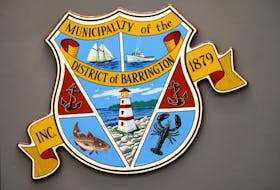ST. JOHN'S, N.L. — It's going to be a busy week for Service Canada employees handling applications for the Canada Emergency Response Benefit (CERB), a program that's likely going to help millions of people unable to earn a living during the COVID-19 pandemic.
The pocketbook stress related to the ongoing public health crisis is unlike anything financial and credit counselling professionals have ever witnessed.
Before any of this, Newfoundland and Labrador was already facing considerable consumer insolvency challenges. Last spring, the insolvency rate hit an all-time high on the Avalon Peninsula, at 7.1 insolvencies per 1,000 residents age 18 or older. Insolvency refers to a state whereby a person owing money cannot pay a debt when it is due. It can lead to a declaration of bankruptcy.
"We've been seeing now for the last three or four years that every year there's been increases in insolvency (for Newfoundland and Labrador)," said Nancy Snedden, a licensed insolvency trustee in St. John's who leads BDO Canada's financial recovery services team in the Atlantic region as a senior vice-president. "We're not expecting that it can continue, but then something like (COVID-19), and you're just blown away by the struggle that people are facing all over the province and all over the country. People were already struggling to make ends meet. People were already struggling to the point where they were $200 away from not being able to pay their bills."

Snedden expects the financial strain will be felt among people living in multiple income brackets.
"When you look at the number of people that could now be laid off, their income could be reduced by far more than $200 if they're only getting that $2,000 (monthly through CERB). And I don't mean to say 'only,' because that's fantastic what the federal government is doing to try and help as many people as possible. But if you're someone who is used to making $3,000 or $4,000 or $5,000 a month and now you're getting $2,000 a month, that is still a struggle."
Unprecedented impact
Al Antle is the executive director of Credit Counselling Services of Newfoundland and Labrador (CCSNL), a charitable organization promoting financial well-being through free counselling and consumer education. He has been engaged in this work for 38 years and has never seen anything comparable to what's happening with the COVID-19 pandemic.
"This is unprecedented. People are losing their jobs," he said.
Snedden and Antle both fear people are going to take on consumer debt at levels previously unheard of.
"Credit Counselling Services of Newfoundland and Labrador is greatly concerned about the numbers of people who will be in an insolvent position when this is all said and done," Antle said. "The last thing the provincial economy needs is a run on consumer bankruptcy."
"I think you'll see for the next couple of months, things will slow down a little bit in our industry," Snedden said. "Not because people don't need our help, but because people are worried that they'll need to continue to use their credit for these next few months to supplement their reduced income, or they're going to be taking advantage of the programs that some of the banks and credit companies have out there to defer payments. … But we're fully anticipating that we'll see a wave like we've never seen before come the summer and fall of 2020."
Practical advice
Whether you're out of work now or still have a job for the time being, Snedden would highly recommend coming up with a budget that addresses the essentials while living on a reduced income. Thinking about ways to be thrifty is also helpful.
"Coupon clipping. Looking for sales at the supermarket. Planning your meals ahead so you're only picking up what you need and not panic buying or buying more than you actually need, so you can reserve those funds for other things you might need. Looking for ways to reduce other expenses you might have. Making a reduction in your cable bill or cancelling your cable and just using Netflix."
Antle also believes in budgeting and would recommend a weekly review of spending to make sure you're not exceeding your income. Right now, he worries people stuck inside are spending more money than they might anticipate through online purchases.

"They'll be shopping online or getting takeout food delivered to the door … confident that they're not spending money. But what we're discovering based on what we're hearing from our existing caseload is that people in fact are spending more than they were spending before."
Similar to Snedden's point on finding ways to be thrifty, Antle advises people not to be wasteful, especially when it comes to the food they cook.
Snedden advised people to use available credit resources sparingly and only for essential purchases.
"And don't use it until you've got a plan in place that you're going to be able to afford to repay it,” she said. “Put that plan in place ahead of actually using the credit, and try to stick to low-interest-rate credit — like lines of credit versus high-interest-rate loans or credit cards that have 20 per cent interest. I would never recommend that someone dip into that, although I know that some people are going to feel that they really have no choice at this time."
Deferrals not ideal
As for the payment deferrals some banks and credit card companies are offering, Snedden said it is important to have a good understanding of what the implications are once the deferrals cease.
"Interest in most of these cases, from what we understand, is going to continue to accrue. What that means is at the end of the six-month deferral where you haven't been asked to make payments, you will actually owe more than you owed today. … I saw a calculation online that made an example that showed your mortgage payment going forward could increase by as much as $50-$60 a month on a $100,000 mortgage by not making a payment for six months. For someone who is already living paycheque to paycheque, that $60 increase in their mortgage, though that might not sound significant, could be significant if they're using every penny that they make from month to month as it is right now."
Antle likewise would proceed with caution when it comes to credit options. He said credit card debt tends to be expensive, though it varies depending on the type of card. He advises against even considering a pay-day loan company.
"Pay-day loan outlets are incredibly expensive places to borrow," he said. "You need to avoid that — for the want of a better word — like the plague. You want to avoid that like you want to avoid COVID-19."
CCSNL typically advises its clients to make purchases with cash to maintain better control over their financial predicament, though Antle understands this may be difficult advice to follow at a time when cash transactions are discouraged for public health reasons.
And while it might not be the easiest time to control such urges, Antle recommends keeping addictions in check, whether it's cannabis, cigarettes or booze.
"Boredom can cause you to consume twice as much," he said. "You need to be careful with that. That stuff costs money."
As for additional help that could come from the government, Antle would like to see wait times reduced for CERB and employment insurance applicants. He would also welcome any legislation addressing the use of wage garnishments to collect debts owed. Antle says the Canada Revenue Agency has used this practise to collect amounts owing, and questions whether it's appropriate to continue doing so in the present economic climate.
@CBNAndrew









